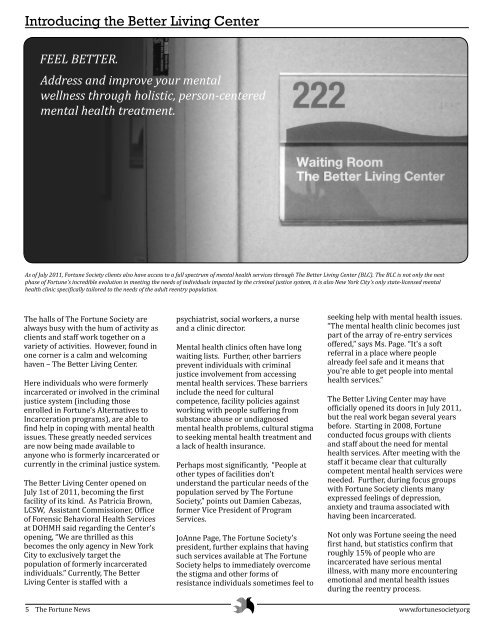<strong>The</strong> halls of <strong>The</strong> <strong>Fortune</strong> <strong>Society</strong> arealways busy with the hum of activity asclients and staff work together on avariety of activities. However, found inone corner is a calm and welcominghaven – <strong>The</strong> Better Living Center.Here individuals who were formerlyincarcerated or involved in the criminaljustice system (including thoseenrolled in <strong>Fortune</strong>'s Alternatives toIncarceration programs), are able tofind help in coping with mental healthissues. <strong>The</strong>se greatly needed servicesare now being made available toanyone who is formerly incarcerated orcurrently in the criminal justice system.<strong>The</strong> Better Living Center opened onJuly 1st of 2011, becoming the firstfacility of its kind. As Patricia Brown,LCSW, Assistant Commissioner, Officeof Forensic Behavioral Health Servicesat DOHMH said regarding the Center'sopening, “We are thrilled as thisbecomes the only agency in New YorkCity to exclusively target thepopulation of formerly incarceratedindividuals.” Currently, <strong>The</strong> BetterLiving Center is staffed with apsychiatrist, social workers, a nurseand a clinic director.Mental health clinics often have longwaiting lists. Further, other barriersprevent individuals with criminaljustice involvement from accessingmental health services. <strong>The</strong>se barriersinclude the need for culturalcompetence, facility policies againstworking with people suffering fromsubstance abuse or undiagnosedmental health problems, cultural stigmato seeking mental health treatment anda lack of health insurance.Perhaps most significantly, “People atother types of facilities don'tunderstand the particular needs of thepopulation served by <strong>The</strong> <strong>Fortune</strong><strong>Society</strong>,” points out Damien Cabezas,former Vice President of ProgramServices.JoAnne Page, <strong>The</strong> <strong>Fortune</strong> <strong>Society</strong>'spresident, further explains that havingsuch services available at <strong>The</strong> <strong>Fortune</strong><strong>Society</strong> helps to immediately overcomethe stigma and other forms ofresistance individuals sometimes feel toseeking help with mental health issues.“<strong>The</strong> mental health clinic becomes justpart of the array of re-entry servicesoffered,” says Ms. Page. “It's a softreferral in a place where peoplealready feel safe and it means thatyou're able to get people into mentalhealth services.”<strong>The</strong> Better Living Center may haveofficially opened its doors in July 2011,but the real work began several yearsbefore. Starting in 2008, <strong>Fortune</strong>conducted focus groups with clientsand staff about the need for mentalhealth services. After meeting with thestaff it became clear that culturallycompetent mental health services wereneeded. Further, during focus groupswith <strong>Fortune</strong> <strong>Society</strong> clients manyexpressed feelings of depression,anxiety and trauma associated withhaving been incarcerated.Not only was <strong>Fortune</strong> seeing the needfirst hand, but statistics confirm thatroughly 15% of people who areincarcerated have serious mentalillness, with many more encounteringemotional and mental health issuesduring the reentry process.5 <strong>The</strong> <strong>Fortune</strong> News www.fortunesociety.org
<strong>Fortune</strong>'s New On-Site Mental Wellness Clinic<strong>The</strong> lack of proper treatment andplanning for incarcerated individualswith mental health disorders increasesthe barriers to successful reentry intothe community. Individuals withmental health disorders and on paroleor probation are twice as likely aspeople without mental illness to havetheir community supervision revoked.<strong>Fortune</strong>'s board and CEO werecommitted to filling this void. Thispassion, coupled with the <strong>Fortune</strong><strong>Society</strong>’s grant writing team andsupport from other executives,eventually resulted in a $200,000 grantfrom the Jacob and Valeria LangelothFoundation. In addition, we alsoreceived $50,000 in funding for theBLC from the vanAmeringenFoundation, whose President, HenryvanAmeringen, is a long-time personaldonor to <strong>Fortune</strong> and a friend of DavidRothenberg. Lastly, the DavidRockefeller Fund – which has providedpast support for <strong>Fortune</strong>'s baselineservices and policy/advocacy work –invested $30,000 in the BLC in its firstyear of operation.<strong>The</strong>se grants provided start-up fundingfor the clinic to support a full-timepsychiatrist and social workers, as wellas covering the cost of an evaluationprogram to determine future directionsfor the clinic. In addition, recognizingthat the need goes far beyond the NewYork City population being served by<strong>The</strong> <strong>Fortune</strong> <strong>Society</strong>, the grant includesthe development of a model programthat organizations in other areas canuse to launch a mental health programof their own.<strong>The</strong> Center is already serving over 100individuals, and has the capacity toserve 550 in three years. To date all ofthose benefitting from these servicesare current clients that have beenreferred to the Better Living Center by<strong>Fortune</strong> <strong>Society</strong> counselors or otherstaff members. In the future, externalreferrals may come from Riker's, theNew York State Office of Mental Health,and from different courts, governmentagencies, nonprofit providers, andmedical centers. “Until this Centeropened there was really nowhere forthe judicial system to refer individualsfor treatment,” Mr. Cabazas explained.CLIIENT TESTIIMONIIALCLIIENT TESTIIMONIIAL“I’ll always remember the ‘light bulb’ moment when I first understood theconnection between my anger issues and the trauma I experienced as a child. It waslike suddenly I had the power – not my past; not my anger. My therapy sessions atthe Better Living Center have since become so interesting and rewarding for methat I really look forward to going each week. I guess I finally realized that I needthat outlet. I need to sit down with someone who will not only listen, they’llunderstand what I’m going through and point me in the right direction.Abraham Lincoln said, “In the end, it’s not the years in your life that count. It’sthe life in your years.” Well, I may not have that many years left, but the life Ilive now is full of purpose and peace. I’m so focused, and so appreciative that<strong>Fortune</strong> now offers mental health services. This is my life, and I’ll never take it forgranted again.”-Eugene T. King, <strong>Fortune</strong> Client and BLC Participant<strong>The</strong> Better Living Center (BLC) wasnamed in accordance with <strong>Fortune</strong>'svision – that by receiving culturallycompetent mental health services byhighly skilled staff, clients will be livingbetter and will be better able to copewith mental illness or with otheremotional issues they may beexperiencing as a result of having beenin the criminal justice system.LEARN MORE ABOUT <strong>THE</strong> BLC:We encourage you to come by andmeet with one of our dedicated BLCclinical staff members. Walk-in"screening" hours are from 9:00am-7:00pm Monday throughWednesday, 9:00am-8:00pmThursdays and 9:00am-5pm Fridays.We ask that you come early in theday if possible, so that we cantake the time to understand andbegin addressing your needs.To Schedule An Appointment:Please call 212-691-7554 ext 370,and ask for Jazzi Zzaman, BLCAdministrative Assistant. We lookforward to speaking to you soon!6 <strong>The</strong> <strong>Fortune</strong> News www.fortunesociety.org


